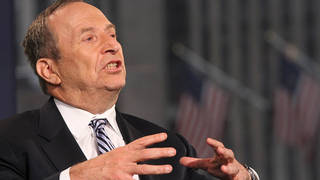
Former US Treasury Secretary Larry Summers has warned that America is losing global influence as other powers form trading blocs
Globalization and the American-led financial order are giving way to a more fragmented world economy in which other powers are aligning in trading blocs that diminish Washington’s global influence, former US Treasury Secretary Larry Summers has claimed.
“There’s a growing acceptance of fragmentation, and – maybe even more troubling – I think there’s a growing sense that ours may not be the best fragment to be associated with,” Summers said on Friday in a Bloomberg News interview. He made his comments following a week of World Bank and International Monetary Fund meetings in which finance chiefs reportedly discussed efforts to “reshape supply chains away from China and other strategic competitors.”

Summers, a former World Bank chief economist who was an adviser to President Barack Obama and served as treasury secretary under Bill Clinton, suggested that US tactics have alienated some governments. “Somebody from a developing country said to me, ‘What we get from China is an airport. What we get from the United States is a lecture. We like your values better than we like theirs, but we like airports more than we like lectures.’”
The emergence of competing economic blocs has accelerated amid the Russia-Ukraine conflict and the US-led sanctions campaign against Moscow. As financial officials of the US and its allies gathered in Washington, Brazilian President Lula da Silva was making a state visit to China and calling for developing nations to move away from the US dollar. China brokered last month’s normalization of relations between Saudi Arabia and Iran, while Russia, the Saudis and OPEC announced a cut to their oil-production quotas, portending more inflation struggles in the West.
“We are on the right side of history – with our commitment to democracy, with our resistance to aggression in Russia,” Summers said. “But it’s looking a bit lonely on the right side of history, as those who seem much less on the right side of history are increasingly banding together in a whole range of structures.”
Policy makers face a bigger challenge than the normal World Bank-IMF issues like debt relief and promoting sustainable development, Summers said. What’s at stake, he added, is “what the broad structure of the system is going to be.”
The current system – born out of the 1944 Bretton Woods Agreement that pegged other currencies to the US dollar, which was then linked to gold – is under threat, Summers said. “If the Bretton Woods system is not delivering strongly around the world, there are going to be serious challenges and proposed alternatives.” RT









